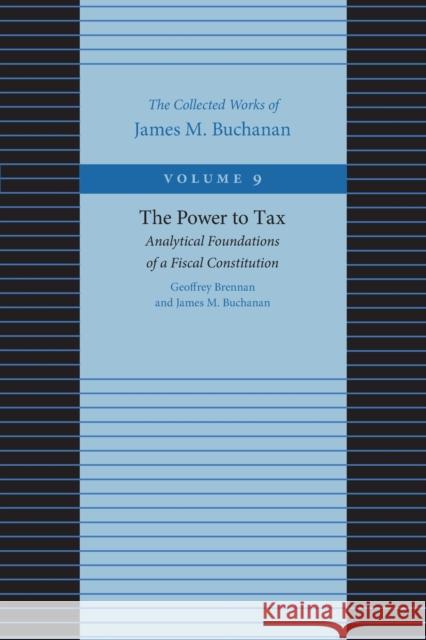Power to Tax -- Analytical Foundations of a Fiscal Constitution » książka
Power to Tax -- Analytical Foundations of a Fiscal Constitution
ISBN-13: 9780865972308 / Angielski / Miękka / 2000 / 254 str.
Commenting on his collaboration with Geoffrey Brennan on "The Power to Tax," James M. Buchanan says that the book is demonstrable proof of the value of genuine research collaboration across national-cultural boundaries. Buchanan goes on to say that "The Power to Tax" is informed by a single ideathe implications of a revenue-maximizing government.
Originally published in 1980, "The Power to Tax" was a much-needed answer to the tax revolts sweeping across the United States. It was a much-needed answer as well in the academic circles of tax theory, where orthodox public finance models were clearly inadequate to the needs at hand.
The public-choice approach to taxation which Buchanan had earlier elaborated stood in direct opposition to public-finance orthodoxy. What Buchanan and Brennan constructed in "The Power to Tax" was a middle ground between the two. As Brennan writes in the foreword, The underlying motivating question was simple: Why not borrow the motivational assumptions standard in public-choice theory and put them together with assumptions about policy-maker discretion taken from public-finance orthodoxy?
The result was a controversial bookand a much misunderstood one as well. Looking back twenty years later, Brennan feels confirmed in the rightness of the theories he and Buchanan espoused, particularly in their unity with the public-choice tradition: The insistence on motivational symmetry is a characteristic feature of the public choice approach, and it is in this dimension that "The Power to Tax" and the orthodox public- finance approach diverge.
James M. Buchanan is an eminent economist who won the Alfred Nobel Memorial Prize in Economic Sciences in 1986 and is considered one of the greatest scholars of liberty in the twentieth century.
The entire series will include:
Volume 1 "The Logical Foundations of Constitutional Liberty"
Volume 2 "Public Principles of Public Debt "
Volume 3 "The Calculus of Consent "
Volume 4 "Public Finance in Democratic Process"
Volume 5 "The Demand and Supply of Public Goods"
Volume 6 "Cost and Choice"
Volume 7 "The Limits of Liberty"
Volume 8 "Democracy in Deficit"
Volume 9 "The Power to Tax"
Volume 10 "The Reason of Rules"
Volume 11 "Politics by Principle, Not Interest"
Volume 12 "Economic Inquiry and Its Logic"
Volume 13 "Politics as Public Choice"
Volume 14 "Debt and Taxes"
Volume 15 "Externalities and Public Expenditure Theory"
Volume 16 "Choice, Contract, and Constitutions"
Volume 17 "Moral Science and Moral Order"
Volume 18 "Federalism, Liberty, and the Law"
Volume 19 "Ideas, Persons, and Events"
Volume 20 "Indexes" "











